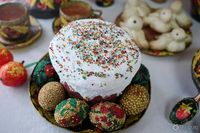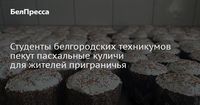As Easter approaches, Russians are turning their attention to a new culinary delight: Dubai Easter cakes. These innovative treats, filled with pistachio paste and crafted from kataifi dough, have captured the imagination of dessert lovers. The excitement surrounding these cakes is palpable, with the average price hovering around 900 rubles. According to a recent study by Avito, the number of requests for these Dubai Easter cakes has skyrocketed to 3,000, reflecting a growing trend among consumers eager to celebrate the holiday with something unique. This surge in interest is reminiscent of the buzz created by Dubai chocolate last year, which had similarly inspired confectioners to experiment with flavors and presentations.
In a parallel development, students from Belgorod technical schools have taken it upon themselves to bake traditional Easter cakes for residents of the border area. This initiative has become a cherished tradition among both students and faculty at the Belgorod College of Public Catering. The quality of their baked goods, combined with their affordability, has made them increasingly popular among locals, drawing in more customers each year. The technical school not only provides delicious cakes but also plays a vital role in supporting the community by donating baked goods to various organizations, including the Complex Center for Social Services, the city department for the association of invalids and pensioners, and the Belgorod branch of the Russian Red Cross.
Elena Borisovich, the Deputy Director for Academic and Production Work at the technical school, explained, "We provide this assistance completely free of charge." This commitment highlights the school's dedication to community service and the importance of celebrating the Christian holiday with those in need. The students, who often work under the guidance of experienced instructors, have embraced this opportunity to give back while honing their culinary skills.
The preparation process for the Easter cakes begins early in the morning. According to Elena Urakaeva, a master of industrial training, teachers sometimes arrive at 4:00 AM, with students following suit by 6:00 AM. The students work in two shifts, allowing for a continuous flow of production. Urakaeva noted that many students are eager to participate in this initiative, and they are all experienced seniors who are well-versed in handling modern equipment in the workshop.
Once the bakers gather all the necessary ingredients, they knead the dough and distribute it into various baking molds. The cakes are then placed in a proofing cabinet before being baked in the oven. After cooling, the cakes are topped with cream and colorful sprinkles, giving them the traditional festive appearance that many have come to expect during Easter.
Liana Altunina, a fourth-year student specializing in confectionery, shared her experience: "Working near the ovens, where it’s always hot, is not easy, but it’s worth it." She has fond memories of baking Easter cakes at home with her grandmother and is excited to apply what she’s learned at the technical school.
The efforts of both the confectioners creating Dubai Easter cakes and the students baking traditional cakes reflect a vibrant culinary culture in Russia as the holiday season approaches. Each group is contributing to the festive spirit in their own way, whether through innovative flavors or time-honored recipes. As the demand for unique desserts grows, it will be interesting to see how these trends evolve in the future.
As the Easter holiday draws near, the culinary landscape is rich with creativity and community spirit, showcasing the diverse ways in which people celebrate this important occasion. The blend of tradition and innovation is evident in the choices available to consumers, from the exotic Dubai Easter cakes to the beloved local recipes crafted by dedicated students. With the combination of these efforts, this Easter promises to be a delicious celebration for all.


